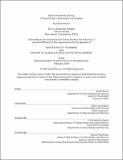Hybrid-industrial zoning : a case study in Downtown Los Angeles
Author(s)
Brown, Sarah(Sarah Dalton)
Download1102052201-MIT.pdf (18.33Mb)
Other Contributors
Massachusetts Institute of Technology. Department of Urban Studies and Planning.
Massachusetts Institute of Technology. Center for Real Estate. Program in Real Estate Development.
Advisor
Marie Law Adams.
Terms of use
Metadata
Show full item recordAbstract
Historically, land use planning has treated industrial land uses either antagonistically or ambivalently. Traditional zoning approaches have restricted, regulated, spatially isolated, and pushed industrial land to the periphery of cities, resulting in a significant loss of urban industrial land across American cities. But as the United States experiences a manufacturing renaissance and cities begin to recognize the value of centrally located industrial land in its contribution to the regional economy, planners are grappling with the issue of how best to secure these viable but vulnerable sites of employment and production. Advanced technologies that are changing the nature of manufacturing and logistics present an exciting opportunity and potential solution: the industrial mixed-use zone. This thesis explores the emerging land use tool of industrial-mixed use zoning, using Los Angeles as a case study. The intent of the industrial mixed-use zone, which permits non-industrial uses, to varying degrees of intensities, in otherwise industrial districts, is to protect central locations for industrial operations when market forces might otherwise price them out. On the one hand, the zone can impede industrial business displacement through offering protection to compatible lighter industrial uses in transitioning neighborhoods. In doing so, it aims to create a live/work urban district in which several planning agendas are met and balanced, providing for industrial employment alongside affordable housing and public realm improvements. On the other hand, without strict use definitions, mix requirements or consistent regulation, the industrial mixed-use zone risks both accelerating the land use conversion process, operating as residential and commercial upzoning, and gentrifying industrial districts toward more artisanal and boutique industrial operations. In 2019, the Los Angeles Department of City Planning will rezone industrial land in Downtown Los Angeles under a new zoning classification: hybrid-industrial. Through an exploration of Los Angeles' industrial land use policies, a process tracing of the evolution of hybrid-industrial zoning, and a dissection of the zoning ordinance's text, this thesis demonstrates the trade-offs associated with a mixed-use district and the potential challenges and pitfalls of implementation.
Description
This electronic version was submitted by the student author. The certified thesis is available in the Institute Archives and Special Collections. Thesis: M.C.P., Massachusetts Institute of Technology, Department of Urban Studies and Planning, 2019 Thesis: S.M. in Real Estate Development, Massachusetts Institute of Technology, Program in Real Estate Development in conjunction with the Center for Real Estate, 2019 Cataloged from PDF version of thesis. Includes bibliographical references (pages 89-93).
Date issued
2019Department
Massachusetts Institute of Technology. Department of Urban Studies and Planning; Massachusetts Institute of Technology. Center for Real Estate. Program in Real Estate Development; Massachusetts Institute of Technology. Center for Real EstatePublisher
Massachusetts Institute of Technology
Keywords
Urban Studies and Planning., Center for Real Estate. Program in Real Estate Development.